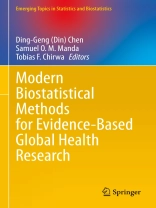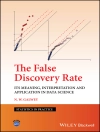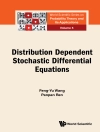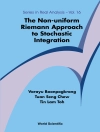This book provides an overview of the emerging topics in biostatistical theories and methods through their applications to evidence-based global health research and decision-making. It brings together some of the top scholars engaged in biostatistical method development on global health to highlight and describe recent advances in evidence-based global health applications. The volume is composed of five main parts: data harmonization and analysis; systematic review and statistical meta-analysis; spatial-temporal modeling and disease mapping; Bayesian statistical modeling; and statistical methods for longitudinal data or survival data.
It is designed to be illuminating and valuable to both expert biostatisticians and to health researchers engaged in methodological applications in evidence-based global health research. It is particularly relevant to countries where global health research is being rigorously conducted.
Inhoudsopgave
1. Harmonization of Longitudinal Population Data: evidence from three rural health and demographic surveillance system nodes in South Africa.- 2. Adjusting for Selection Bias in Assessing the Efficacy of Health Inputs on Birth Outcome: Evidence from South-Saharan Africa.- 3. An Indirect Assessment of the Effect of Anthropogenic Activities on the Ecology of the Intermediate Snail Host for Schistosoma Haematobium.- 4. Diagonal Reference Modeling of Effects of Couples’ Educational Differences on Women’s Health Care Utilization in Sub-Saharan Africa – Gebrenegus Ghilagaber, Michael Carlson.- 5. Sequential Modeling of Parity Progression Ratios in Sub-Saharan Africa.- 6. Evidence-informed Public Health, Systematic Reviews, and Meta-analysis.- 7. Meta-analysis Methods and Empirical Comparison of Aggregate Data and Individual Participant Data Results from Sample Survey Data.- 8. Statistical Meta-analysis and its Efficience Between Summary Statistics and Individual Participant-level Data: A Monte-Carlo simulation study.- 9. Multivariate Disease Mapping for Multiple Health Outcomes.- 10. Measuring Spatial Dependence of Non-communicable Diseases in South Africa.- 11. Mapping Health Outcomes in Sub-Saharan African Region Using Survey Data, Adjusting for Survey Data – Sheyla Rodrigues Cassy.- 12. Spatial Multi-criteria Decision Analysis in Health Sciences: Fifteen years of applications and trends.- 13. Estimating Determinants of Stage at Diagnosis of Breast Cancer Prevalence in Western Nigeria Using Bayesian Logistic Regression.- 14. Dynamic Bayesian Adjustment of Educational Gradients in Divorce Risks: Disentangling causation and misclassification.- 15. Bayesian Dynamic Models for Time-Varying Outcomes: Applications to a patient cohort on ART.- 16. Suicide Ideation and Associated Factors Among School-going Adolescents in Namibia: A Multilevel logistic regression.- 17. Bayesian Inference in the Extended Generalized Gamma Model and its Special Cases: With applications on demographic and health survey data from Sub-Saharan Africa.- 18. Changing Effects of Covariates on Childhood Mortality in Sub-Saharan Africa: A dynamic Bayesian survival modeling approach.- 19. Group Outliers and Influence Assessments in Clustered Survival Data Modeling.- 20. Joint Modeling of Competing Risks Survival and Longitudinal Data
Over de auteur
Ding-Geng (Din) Chen is an elected fellow of the American Statistical Association and an elected member of the International Statistical Institute. He is currently the executive director and professor in biostatistics at the College of Health Solutions, Arizona State University, USA. Professor Chen is also the DST-NRF-SAMRC research chair in Biostatistics and an Extraordinary Professor at the Department of Statistics, University of Pretoria, South Africa. He was the Wallace H. Kuralt Distinguished Professor at the University of North Carolina at Chapel Hill, a Professor in Biostatistics at the University of Rochester and the Karl E. Peace endowed eminent scholar chair in biostatistics at Georgia Southern University. He is also a senior consultant for biopharmaceuticals and government agencies with extensive expertise in clinical trial biostatistics and public health statistics. Professor Chen has written more than 200 refereed publications and co-authored/co-edited 33 books on clinical trial methodology, meta-analysis, causal-inference, Monte-Carlo simulation-based statistical modeling, big data analytics, and statistical modeling for the public health applications. His research has been funded as PI/Co-PI from NIH R01s and other state and federal government agencies with multi-million dollars.
Samuel Manda is a Professor and Head of the Department of Statistics, University of Pretoria, Pretoria, South Africa. He also holds Extraordinary Professorships at the Universities of Stellenbosch and North-West His main research interests concentrate on modern statistical methods for the analysis of survival, multivariate spatial data; and evidence and data combination. He has recently started working on multivariate small area estimation and causal effect estimation. He has also been involved with the analysis of COVID 19 transmission parameters and prediction in sub-Saharan Africa. . He has published more than 150 peer-reviewed publications and book chapters in biostatistics methodology and applied sciences. He is a National Research Foundation (South Africa NRF) rated Scientist.
Tobias Chirwa is currently the Head of the University of the Witwatersrand (Wits) School of Public Health (SPH). He is also the current Programme Director for the Sub-Saharan Africa Consortium for Advanced Biostatistics training (SSACAB) and co-leads the National Institutes of Health (NIH) Fogarty and WHO/TDR funded Implementation Science/Research program. He has developed and led capacity building initiatives including Ph D programs, MSc programs in biostatistics, informatics and implementation science at University of Malawi (UNIMA) and Wits. Tobias has co-authored more than 95 internationally peer-reviewed articles. His methodological applications of interests are in longitudinal and survival data analysis.












